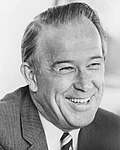Blanket primary
In the Democratic Party primary, Henry M. Jackson, who had served in the United States Senate since 1953, faced criticism for his support of military spending and the Vietnam War. This position caused members of the national party involved in peace activism, including Eugene McCarthy, Allard K. Lowenstein, and John Kenneth Galbraith, to petition state politicians to challenge Jackson. They found Carl Maxey, the first African American in Eastern Washington to qualify as an attorney, who resigned his position as chair of the Washington Democratic Council, an anti-war organization, to run for office. Maxey had previously worked for Jackson on his Senate campaigns but he publicly opposed the Vietnam War, particularly in relation to the drafting of African Americans at disproportionate rates. [1]
In May 1970, Maxey won the endorsement of the King County Democratic Convention. During the same month, President Richard Nixon announced an escalation to the Vietnam War as American forces invaded Cambodia. This decision led to protests across the country and the shooting of four anti-war protests at Kent State University in Ohio. Two months later, at the state party convention held in Spokane, Washington, supporters of Maxey disturbed the speech given by Jackson. The opposition pushed Jackson to the center of his party and he frequently said, "I'm proud of the fact that during my term in the Senate I opposed both McCarthys", comparing Eugene McCarthy and Joe McCarthy. [1]
Jackson had support from state Republicans, who donated hundreds of thousands of dollars to his primary campaign. Montgomery Johnson, the state party chairman, and Governor Dan Evans had difficulty finding a Republican challenger as the national party, including Nixon, discouraged any strong opposition. They finally recruited state senator, Charles Elicker, who beat four other candidates to win the party nomination. [2] In the primary on September 15, 1970, Jackson won the Democratic nomination with 497,309 votes and sweeping every county in the state. Maxey won second place in the blanket primary, with 79,201 votes and Elicker came in third with 33,262 votes. [1] The other candidates were two Democrats, John "Hugo Frye" Patric and Clarice Privette, and four Republicans, R. J. "Bob" Odman, William H. Davis, Howard S. Reed and Bill Patrick. [3]
This page is based on this
Wikipedia article Text is available under the
CC BY-SA 4.0 license; additional terms may apply.
Images, videos and audio are available under their respective licenses.



